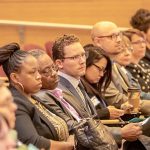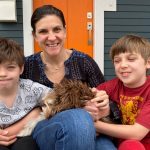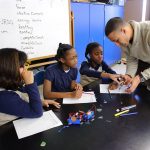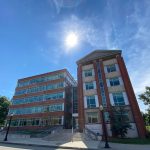Historical monuments are intended to be timeless, but almost all have an expiration date. As society’s values shift, the legitimacy of monuments can and often does erode,” say Alan Marcus, a professor of curriculum and instruction at the Neag School, and Walter Woodward, an associate professor of history at UConn. “This is because monuments – whether statues, memorials or obelisks – reveal the values of the time in which they were created and advance the agendas of their creators.”
The summer is typically a time for school superintendents to reflect on the previous school year and start thinking about the year ahead. However, preparation looks very different in the age of COVID-19 as school districts choose between three reopening models: fully in-person, hybrid, or remote.
“I want to take the information my students trusted me with and give it a voice, give it a platform, allow it to start new conversations, and new ways of thinking,” says Truth Hunter ’14 MA, Neag School of Education Dean’s Doctoral Scholar. “That is how I hope to use my experience as a Dean’s Doctoral Scholar.”
This summer marks one year since the Neag School’s University of Connecticut Administrator Preparation Program (UCAPP) began implementing changes as part of a nationwide effort known as the University Principal Preparation Initiative (UPPI). In 2016, UConn was one of seven universities selected to join this initiative, funded by New York City-based Wallace Foundation, aimed at improving training for aspiring administrators.
Congratulations to our Neag School alumni, faculty, staff, and students on their continued accomplishments inside and outside the classroom.
The Neag School Alumni Board seeks to support a Neag School graduate student(s) with strong academic achievement and in need of financial assistance through this scholarship fund. Apply by Oct. 30, 2020.
The University of Connecticut has been awarded a $5 million grant from the U.S. Department of Education’s Institute of Education Sciences to examine and strengthen gifted education opportunities for underserved populations through four studies. UConn’s National Center for Research on Gifted Education (NCRGE) will investigate strategies for recognizing and responding to untapped talent and explore the outcomes of gifted education services.
The Neag School is proud to announce for the 2020-21 academic year a number of new hires across each of its academic departments. In addition, the School announces several faculty promotions and new appointments for existing members of the Neag School community, effective Aug. 23.
“Work hard on keeping the conversation channels open. Having a trusted and caring adult is critical for every child,” writes Sandra Chafouleas in her new blog on Psychology Today.
Researchers from UConn and the Cary Institute of Ecosystem Studies have been awarded a $3 million grant from the National Science Foundation Research Traineeship Program to fund a new program to help train graduate students in risk analysis to build resilient landscapes in the face urbanization and climate change.










